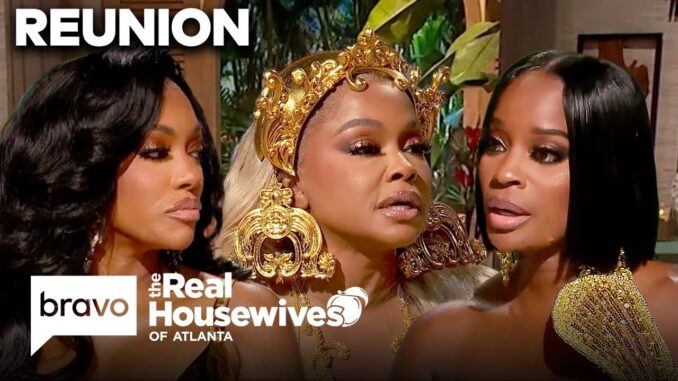
The Crooked Yardstick: Porsha, Phaedra, and the Double Standard of Forgiveness
The human heart, a labyrinth of emotions and loyalties, often operates on a calculus far more complex and contradictory than logic would dictate. Nowhere is this more vividly illustrated than in the realm of forgiveness, where the severity of an offense can sometimes pale in comparison to the perceived status of the offender. The tangled web of relationships on reality television often serves as a magnified petri dish for examining such psychological phenomena, and the enduring saga between Porsha Williams, Phaedra Parks, and Shamea Morton on The Real Housewives of Atlanta offers a compelling, if painful, case study in the insidious nature of double standards.
A double standard, at its core, is the application of different sets of principles for situations that are, in essence, similar. It's the proverbial crooked yardstick, measuring behavior with selective leniency or harshness depending on who is holding the measuring tape, or, more accurately, who is being measured. This isn't always a conscious act of hypocrisy; often, it stems from deep-seated personal biases, the nuances of shared history, or even the immediate emotional impact of an event.
Consider the monumental betrayal involving Phaedra Parks. In a scandal that rocked the Real Housewives universe, Phaedra was exposed for fabricating a vile rumor about Kandi Burruss, accusing her and her husband, Todd Tucker, of attempting to drug and sexually assault Porsha. Porsha, having repeated this egregious lie on camera, eventually learned the truth of Phaedra's deception. The lie was not only a profound character assassination but also deeply dangerous, touching upon serious criminal accusations. Phaedra, Porsha's close friend and confidante at the time, was the architect of this monstrous untruth. The fallout was immense, leading to Phaedra’s eventual departure from the show. Yet, in the years that followed, Porsha publicly expressed a path to forgiveness for Phaedra. She spoke of healing, the passage of time, and even a renewed, albeit distant, camaraderie. Despite the sheer magnitude and malicious intent behind Phaedra's actions, Porsha’s public stance eventually softened into understanding, if not full reconciliation.
Contrast this with the long-standing animosity Porsha harbored for Shamea Morton. Shamea, a friend of Porsha's for many years, was accused by Porsha of gossiping about Porsha's new relationship with Dennis McKinley. Specifically, Shamea was alleged to have spread rumors about Dennis having a "Porsha" tattoo on his leg from a previous relationship, and questioning the legitimacy of Porsha’s pregnancy. While certainly hurtful and a breach of trust, Shamea's alleged transgression was, by any objective measure, gossip. It lacked the heinous, legally perilous, and reputation-destroying intent of Phaedra’s lie. Yet, Porsha’s reaction to Shamea was protracted, intense, and profoundly unforgiving for a significant period. Their friendship was severed, and Porsha often met Shamea's attempts at reconciliation with a cold shoulder, her anger seemingly disproportionate to the offense when weighed against Phaedra’s much grander deceit.
The glaring disparity in Porsha's response unveils the intricate mechanics of a double standard. Why was the architect of a potentially criminal, character-destroying lie ultimately extended more grace than a friend who allegedly engaged in hurtful, but far less damaging, gossip? Several factors likely played a role.
Firstly, the nature of the relationship's history is paramount. Phaedra was not just a friend but a long-standing ally, a "ride-or-die" at various points in Porsha's journey on the show. The depth of this past bond, however tarnished, might have created a reservoir of emotional capital that eventually allowed for forgiveness. Shamea, while a friend, perhaps lacked that same deeply ingrained history or perceived level of intimacy. When betrayal comes from someone you've given a piece of your soul to, the pain is immense, but so too can be the desire to restore some semblance of what was lost, or to understand the forces that led to its destruction.
Secondly, the personal impact and context of the revelation are crucial. Phaedra's lie, while horrific, ultimately blew up in Phaedra's face, leading to her public downfall and removal from the show. Porsha, while implicated, was also seen as a victim of Phaedra's manipulation. The consequences were largely externalized from Porsha's immediate life. Shamea's alleged gossip, however, directly targeted a nascent and vulnerable period in Porsha's life—her new relationship and pregnancy. This felt like a direct assault on Porsha’s personal happiness and stability, coming from someone she expected to be a cheerleader, not a detractor. The visceral, immediate sting of that specific betrayal might have felt more personal and thus less forgivable than the grander, more abstract, and ultimately externally punished, lie of Phaedra.
Finally, the perception of intent and power dynamics can influence the "forgiveness scale." Phaedra, in her maliciousness, held a certain power over Porsha by manipulating her into repeating the lie. Forgiving her could be seen as Porsha rising above the situation, showcasing growth, and even validating her own journey post-scandal. With Shamea, the dynamic was different; Shamea was perceived as a lesser player, perhaps a "hater" in Porsha's mind, someone who should have known her place as a supportive friend. The gossip felt like an unprovoked attack from a peer, rather than a calculated, almost Machiavellian, manipulation from a former confidante.
Porsha Williams's contrasting reactions to Phaedra Parks and Shamea Morton are not merely fodder for reality television drama; they are a poignant illustration of a fundamental human tendency. We are not always rational actors, and our capacity for forgiveness is often less about the objective severity of an offense and more about the intricate, subjective tapestry of our relationships, our vulnerabilities, and the specific sting of a particular betrayal. The crooked yardstick of the heart reminds us that while we may champion principles of fairness, the path to forgiveness is often paved with biases, selective memory, and the deeply personal calculus of emotional impact. It is a reminder to examine our own scales of justice, for we too, are often guilty of using a double standard, even if unconsciously, when measuring the trespasses of those closest to us.